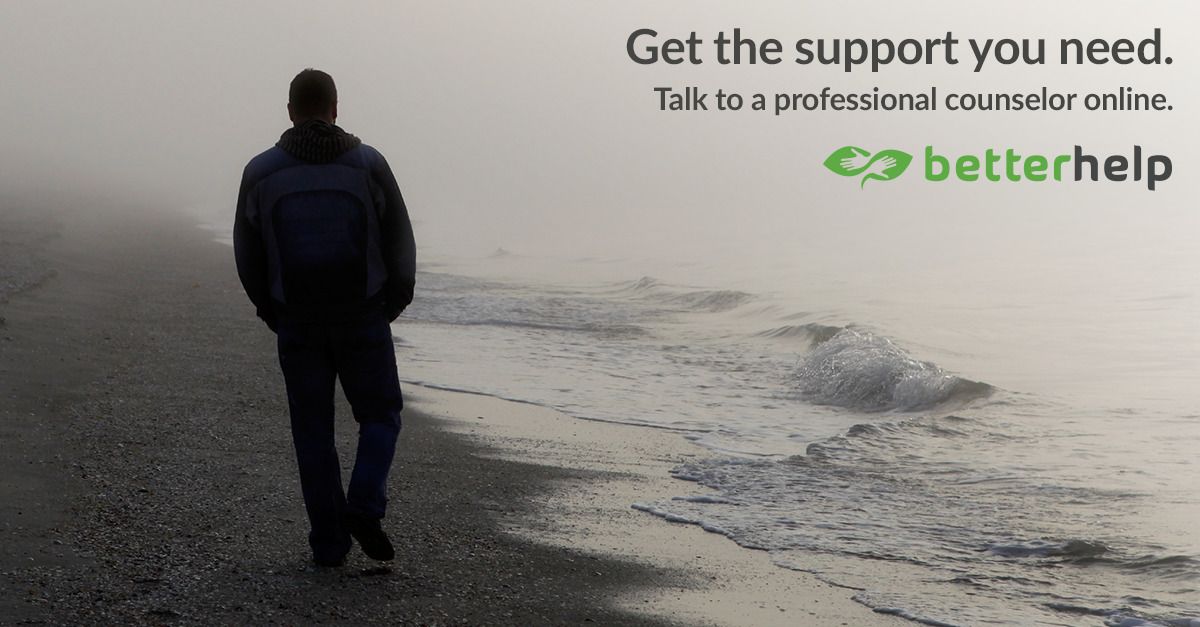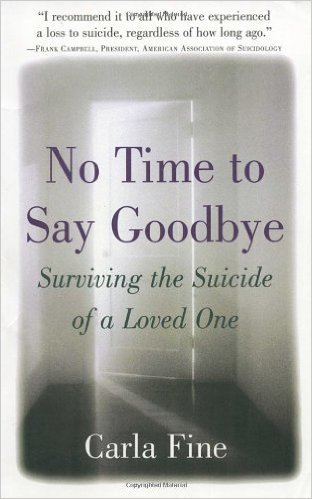Coping with suicide - help from experts and those who have been through it
Help and advice for coping with suicide in the family. These pages are written by the author of this site, Elizabeth Postle, who had a 45 year career in health, an expert from the American Foundation for Suicide Prevention, and other guest writers who have experienced a suicide in the family.
The illness of unhappiness or the black cloud of depression descending are familiar to many of us either in oneself, or through a family member. It is a traumatic time for everyone involved; from the individual who often has no specific reason for this black period in life, to the family who feel helpless to know what to do.
Sometimes the depression is obvious to people around and help can be obtained via the doctor or the psychiatrist. In these cases a more normal balance of mood swings can resume and life goes on.
However, there are many people who are ashamed of these feelings, who
pretend they are fine, who refuse to see doctors, who even try to hide
how low they are feeling from friends, family and even from themselves.
They feel guilty and have low self-esteem. “How can I be like
this when I am so lucky?”, they ask themselves. Drinking more alcohol,
taking drugs or self harming may occur, making the individual’s feeling
of unworthiness much worse.
Sadly, the ability to hide how much
they hurt can fool family and friends, until the day the unthinkable
happens, a suicide occurs. Sometimes someone who has been depressed
will announce that they are feeling much better. And then the suicide
occurs. They felt better because they had finally made a decision to
end it all. But no-one could have known that.

It's important to forgive yourselves
The pain and trauma caused by the loss is multiplied by the guilt that no-one saw it coming or realised what was happening.
You must forgive yourselves, because even trained professionals can often miss important signs.
Life is so busy these days, with work, coping with families, travel, social lives, that in the rush keeping a close watch over all friends and family members is almost impossible.
No-one knows how you feel unless you tell them
If a depressed person ever talks about taking their own life, or say life is worthless, then get help urgently. Seek help first from your doctor.
There are also many online resources and helplines listed on this page.
But life isn’t that simple. Suicides can occur in individuals who you would never guess were so low in self-esteem that they deemed their life worthless. Sometimes it is the rat race of life at school or work. Struggling with traffic or finances on a daily basis, just all becomes too much. They don’t seek help. At the lowest point of their lives they see only one way out. They feel totally burdened by life, and it is just too much to cope with.
How to cope when you have lost someone you know to suicide
The grief you feel
after a suicide is compounded by all kinds of feelings in addition to
those everyone feels when someone dies. There is a sense of betrayal –
how could they go and leave me behind? - did they really prefer death to
being with me? There is also the shame attached to suicide in our
society. In some religions especially, there is a real stigma attached.
But it is not your fault. You can never know exactly what is going on
in someone else's mind.
If
the person who took their own life had been suffering pain for a long
time, for whatever reason, perhaps years of abuse or ill-treatment, or
depression, you might even feel relief that they are no longer
suffering. But then there is the guilt that you couldn't have helped
end the suffering.
Get help for yourself
Survivors of suicide support groups can be helpful. Some bereaved people end up feeling suicidal themselves, so a support group is important. Even a regular bereavement support group is good if there is no specialist support group in your area. You will be experiencing many of the same emotions of grief.
Make sure that you
are getting the support you need. Not all groups will be what you are
searching for. Don't let it descend into an argument about whether it
was better or not to get a suicide note. Either way, it doesn't really
help you. There will always be so many questions unanswered. You need
to accept that and move on.
Survivors
often feel very isolated, and it's difficult to find someone to talk to
who understands. Try to open up to someone you trust. It is important
not to bottle up your feelings. It might be useful to write to the
person you have lost and explain how you are feeling. Or write a poem
or journal. Some people express themselves through art or music.
Anything which helps to work through the feelings you have and let them
go.
You might also need some one-on-one counseling from an expert. We have partnered with BetterHelp.com who provide online counseling by expert psychologists. This is a totally confidential service. You can read more about them here.
Try not to ruin your life with unnecessary guilt feelings. Learn from this devastating experience. Look around you, enjoy the friends and family you have. When you feel low, tell a friend, talk problems through. Ring a friend if you are lonely. Your friends and family want to help you, talk to them, enjoy their company. Move on as best as you can, live again for yourself and the rest of the family.
Do grieve, cry for your loved one but also celebrate the happier times you shared with them. Laugh with their friends over holidays and events you shared. See Grief and the holidays for help coping with anniversaries and festive seasons.
Don't define their life by their death. Remember the good times too.
Due to the modern addiction to emails, Facebook and texts, people are becoming more isolated. Long telephone conversations are becoming a thing of the past. Long hours in front of the TV screen are becoming the norm. Personal social contact is being pushed aside, sadly as we are all the losers in this.
Learn from this. Make sure that you spend special time with those friends and family you have around you. Make time to sit down, have a meal and talk. Drop round on friends and have a cuppa. Don’t just send a text.
But above all, don’t spend too much time on “what ifs”. You cannot ruin your own life over it, your life is precious too, and you have to make the most of every day.
Remember the best and happiest times and realise that there was nothing you could have done. Everyone is an individual and responsible for their own actions. Our children are only on loan to us.
Recommended Read:
No Time To Say Goodbye- Surviving the Suicide of a Loved One by Carla Fine
Carla Fine lost her husband to suicide and her book expresses all those feelings that she didn't believe anyone else could understand. She brings all these emotions into the light so that survivors don't feel so alone.
RElated Pages:
Read about Male Depression and Suicide by Cheryl Ronzoni from the American Foundation for Suicide Prevention
Read about Teen Suicide and CyberBullying and Find many Resources for Help and Support
Elder Suicide - the risks and how to prevent it
The following blog post by Pamela Hester King explores the need to find someone to blame, and the feelings of anger towards the one who has taken their life. It tells how she found a way to think about what happened which allowed her to move forward:
This story by Anne Gordon relates how she recovered after the suicide of her brother:
Dealing with Grief after Suicide - A Survivor's Story
- Grief and Sympathy Home
- Coping with Suicide
Where to get help:
Have You Considered One-on-One Online Grief Counseling?
Get Expert and Effective Help in the Comfort of Your Own Home
The following information about online counseling is sponsored by 'Betterhelp' but all the opinions are our own. To be upfront, we do receive a commission when you sign up with 'Betterhelp', but we have total faith in their expertise and would never recommend something we didn't completely approve.
Do you feel alone and sad with no support and no idea how to move forward? It can be tough when you are stuck in grief to find the motivation to get the most out of your precious life.
Online counseling can help by giving you that support so you don't feel so alone. You can have someone to talk to anytime you like, a kind and understanding person who will help you to find meaning in life again, to treasure the memories of your loved one without being overwhelmed and to enjoy your activities, family and friends again.
- Simply fill out the online questionnaire and you will be assigned the expert grief counselor most suitable for you. It only takes a few minutes and you don't even have to use your name.
- Pay an affordable FLAT FEE FOR UNLIMITED SESSIONS.
- Contact your counselor whenever you like by chat, messaging, video or phone.
- You can change counselor at any time if you wish.
- Click here to find out more and get started immediately.
- Or read more about how online counseling works here.
Sales from our pages result in a small commission to us which helps us to continue our work supporting the grieving.
Hypnosis for Grief - 10 Ways It Can Help You
Try a gentle hypnotherapy track to relax the mind. Learn how self-hypnosis can help you cope with grief at any time of the day or night.

For Remembrance:
Sales from our pages result in a small commission to us which helps us to continue our work supporting the grieving.
Memorial Jewelry to Honour a Loved One
Check out our lovely range of memorial jewelry for any lost loved one. Pendants, necklaces, rings or bracelets, we have them all in all kinds of styles. Choose for yourself or buy as a sympathy gift.
Create an Online Memorial Website
Honour your loved one with their own memorial website. Share photos, videos, memories and more with your family and friends in a permanent online website. Free for basic plan with no ads.










